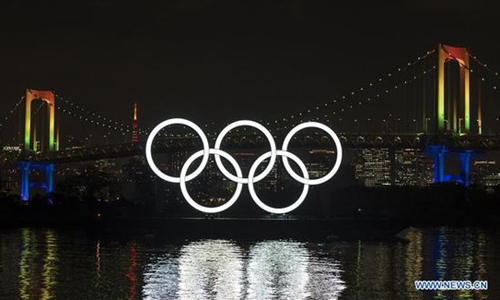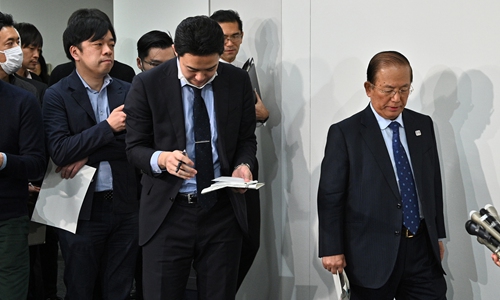Speculation about possible cancellation of the Tokyo 2020 Olympics if Japan fails to contain the deadly coronavirus by May has triggered heated online debate, as the highly anticipated sports event is also crucial for the country that has been engulfed in a stagnation. Though International Olympic Committee (IOC), officials and analysts see any cancellation as “unlikely,” serious questions were raised on event’s safety given a rapid spike of infections in Japan. Japanese government has been under fire for its slow response and incompetency in handling the outbreak.
The scheduled event reminds Japanese people of the ‘golden age’ after Japan held its first Olympic Games in 1964, representing reacceptance to the international community after the World War II and helping it rebuild friendships with former enemies.
Different from the previous 1964 Tokyo Olympics that was held to promote Japan’s national prestige, Tokyo 2020 has a different meaning for the Japanese people, Yoshikazu Kato, a Japanese adjunct associate professor of the Asia Global Institute at the University of Hong Kong, told the Global Times on Wednesday.
“It is seen as an opportunity to unite the entire Japanese nation after a long period of economic stagnation, boost Japanese people’s self-confidence, and increase Japan’s international visibility, especially after Japan has experienced a ‘lost 30 years’ and continuous decline of its international status,” he said.
Besides expectations from the Japanese people, hosting the event is also a political task to the Abe administration, which has been the longest in the history of the constitutional government, Kato noted.
Dick Pound, the longest-serving member of the IOC, told AP that there is a three-month window, more likely a two-month one, to decide whether Tokyo 2020, would be cancelled as the novel coronavirus pneumonia (COVID-19) continues envelop the nation. Such a decision may be postponed until late May, the media report said.
He raised questions about the potential to control the virus and the magnitude of preparation work regarding the event including the completion of, the Olympic Village, food supplies and if hotels could provide a safe environment for travellers, according to the media report.
For Japan, the political consequences of the possible cancellation of the Olympics could be huge, according to analysts.
“If the event is canceled due to the failure of Japanese authorities to contain the coronavirus spread, whether Shinzo Abe could continue to stay in office will be a question. The cancellation would trigger a political earthquake,” Zhang Jifeng, vice director of the Institute of Japanese Studies at the Chinese Academy of Social Sciences, told the Global Times on Wednesday.
The cancellation would not only lead to economic losses but will also heavily weigh on Japan’s future development, in addition to the impact of the deadly virus, the country’s overall growth perspective would be significantly dampened, the expert said.
“However, it could be a reminder to warn the Abe administration to handle the coronavirus more effectively, making more efforts in curbing the spread by whatever means possible,” Zhang said.
The overall number of confirmed cases in Japan surpassed 800 on Wednesday, and among passengers and crewmembers of the Diamond Princess cruise liner, 691 cases have been confirmed, Japan-based NHK reported on Wednesday.

Difficult choice
Even though Japanese officials and the IOC dismissed Pound’s concerns on Wednesday, rumors over a possible cancellation, which would be the first time in modern history, spark discussion on whether the event could proceed and if Japan could effectively contain the virus in time, embodying a complex mind-set since cancelation of the Olympic Games would deal a heavy blow to Japanese society and its global reputation.
“Tokyo 2020 was informed that ‘the three-month window’ is not necessarily the IOC’s collective view,” the 2020 Olympics organizing committee told the Global Times in an email on Wednesday.
“We have never discussed cancelling the games. Preparations for the games are continuing as planned,” the committee said, noting that countermeasures against infectious diseases constitute an important part of Tokyo 2020’s plans to host a safe and secure games.
The IOC also noted “it is in contact with the World Health Organization, as well as its own medical experts. We have full confidence that the relevant authorities, in particular Japan and China, who will take all necessary measures to address the situation.”
Minister for Tokyo Olympics and Paralympic Games Seiko Hashimoto also told an opposition lawmaker that Pound’s remark does not reflect the official view of the IOC, but it’s an explanation that IOC is preparing to hold the event as scheduled, according to NHK.
However, questions have been raised regarding Japan’s ability to control the coronavirus, or if it can still host the Olympics. More questions are being raised about the potential risks associated. Despite the public is having high expectations for the event, the government’s response to the coronavirus has drawn harsh criticism.
Facing uncertainties, Chinese companies that sponsor the upcoming events like the Chinese e-commerce giant Alibaba and Anta Sports did not make any comment on possible cancellations, which are likely to cause direct losses, as some media reports suggested that Tokyo is about to spend more than $20 billion on hosting the event.
China’s General Administration of Sport said on Wednesday that some of China’s national qualifying events for Tokyo 2020 are expected to be delayed due to the outbreak.
However, the authority assured recently that Chinese athletes have been preparing for Tokyo 2020 in spite of difficulties posed by the outbreak, and the authority has come up with a variety of measures in ensuring training such as enclosed conditions and sealing-off apartment management, according to media reports.
Social & economic impact
For the sports industry, 2020 should have become a big year as various sports events have been planned, however, the ongoing epidemic cast a shadow over the sector due to more events being cancelled around the world. The Japanese government announced to cancel or postpone large-scale sports and events, local media reported on Wednesday morning, while more sports events like the Ireland-Italy Six Nations game were called off due to concerns over public health.
Following criticism on the slow response, the Japanese government adopted a basic policy to re-examine the necessity of holding big events, given the high risks of massive human-to-human transmission, and some government experts also suggested that it would be critical in the next week or two to determine whether the virus would spread further in the country, local media reported on Wednesday.
Some Japanese netizens said it’s still too early to have a final say on this matter, hoping that the event could be held as scheduled.
“Now the infrastructure is completed, and we have spent extremely a lot on it, needless to say the monetary costs for other preparations,” a netizen said.
Another commentator called Hoshizora claimed that Abe should take full responsibility if the Olympics were cancelled, and said that the Japanese government should be blamed for not taking precautionary measures at the beginning. “We, as well as the athletes, have prepared so much for the huge event. It is really sad if we have to stop it,” another netizen said.
The coronavirus has no borders and the global community has to embrace this unprecedented challenge together, according to officials and analysts.
“From the bottom of our heart, we hope Japan can get better soon, and we, together, can enjoy this celebration of sport and revival,” Zhang said.


